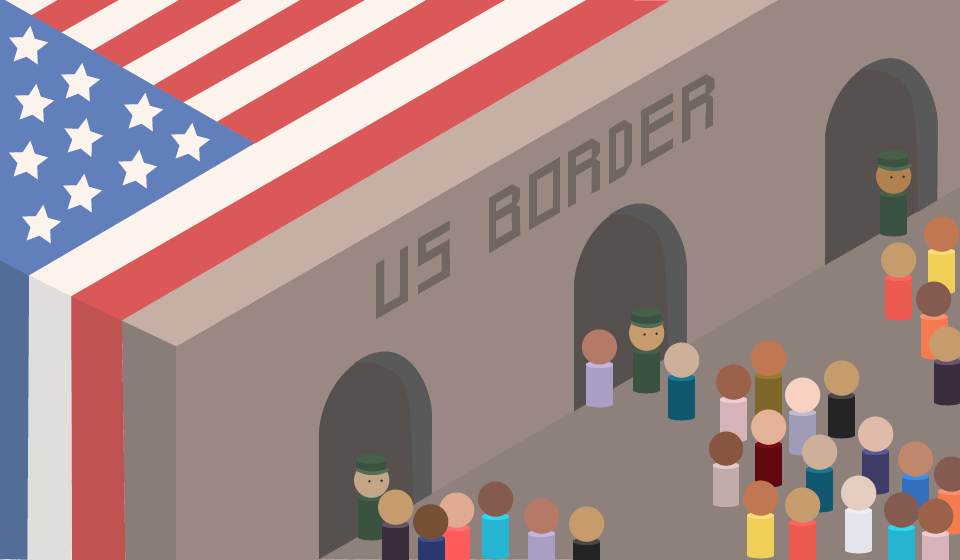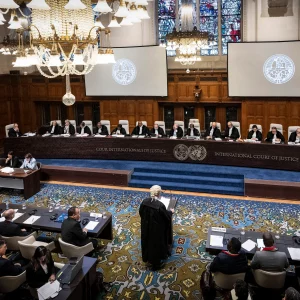 RESOLVED: The United States federal government should establish open borders.
RESOLVED: The United States federal government should establish open borders.
Affirmative Constructive Speech (Nathan Fillingim-Selk)
The U.S. has a border problem. According to the American Immigration Council, the cost of enforcing the U.S.-Mexico border has increased tenfold since 1993, yet people still cross the border in search of a new life in America. These immigrants present a huge policy question mark. Should these immigrants be allowed to become part of the U.S. or should they be sent back? This difficult issue has lead to inconsistent immigration policies that have lead to deaths at the border, family break ups and needless government expenditure. However, the source of this dysfunction is the border itself. These issues ultimately stem from America trying to enforce the artificial line that dictates where someone can live and work. Instead of looking for ways to cramp down on immigration that would only exacerbate the aforementioned issues, the U.S. should institute open borders and phase out customs and border patrol. That would not only solve our border issues but it would also uphold the values of a merit based society while improving the economy.
A core American value is that everyone has a chance to succeed because, as long as you work hard, you will find a place in this country. Borders deny this principle and are therefore un-American. Because of borders, people are prevented from searching for better lives for themselves and their families. Right now, America’s opportunities are mostly offered to people who are fortunate enough to have citizenship, and most Americans are citizens by birth. This means that the current system highly values the way in which a person was born. Because babies have no hand in how, where and to whom they are born, this system is unfair. A person should not be preferred because of something they did not earn. So, it should be the goal of the American government to uphold the American dream and its core principles and not allow birth dictate what a person can do. It is morally correct and in keeping with American ideals to mitigate the natural lottery and allow for equal opportunities by absolving borders.
This abolishment would lead to huge gains in the American economy. This is because it will allow more efficient professional specialization throughout the country. If Jhon, a non-citizen, can do the job better than Jason then Jhon should have the job. That would be a more efficient use of talent. But, as it stands now, Jhon may not be allowed the job because he is denied legal immigration leading to less productive results from the workforce. Open borders will lead to a more efficient economy and prosperous America as output increases in tandem with specialization.
The American dream is a deeply ingrained aspect of American culture. America is not about a person’s parents or their work in the past, it is about the talent and effort of a person in the moment to make a better future. Borders deny too many people the opportunity to pursue the American dream, and as a consequence they hurt the economy. Open borders would lead to equal opportunities to pursue the American dream while improving the nation’s economy.
Cross-Examination of the Affirmative by the Negative
RR: If an alien does not want to be separated from his or her family, why can’t he simply choose to not violate the laws of another country?
NFS: If a law is unjust, it should not have the authority to break families up. It is morally wrong for the U.S. to break families up based on artificial lines in the sand.
RR: Entitlement programs like social security are teetering on the verge of collapse. Why is it not moral policy to prioritize the access of citizens to those services over that of aliens?
NFS: We should prioritize social security more than we do now; opening borders would do just that by reliving some budget strain and allowing the government to supplement pensions. Besides, social security is paid into: “neither immigrants nor anyone else is able to collect Social Security benefits without someone paying Social Security payroll taxes into the system.”
RR: You mentioned that you wished to mitigate the effects of the natural lottery when economic inequalities are the norm, not the exception, around the world. What business does a responsible government that barely discharges its current functions have in attempting to correct miscarriages of fate across the world?
NFS: Just because inequitable circumstances are often accepted, does not mean they are justified. There are no benefits to inequitable circumstances, therefore they should not be norm and the government should not accept them as such. Instead, the government should enact policies that would change the expectations around inequitable circumstances, like open borders.
RR: On the example of Jhon and James, the United States has a higher federal minimum wage than most nations in the world, and foreigners would work at wages lower than the going wage in the labor market today. Why should we drive down wages for ordinary Americans in an effort to make the U.S. more accessible to foreigners?
NFS: Overall, open borders will bolster the American economy by creating a more efficient workforce. Additionally, if the real wage increase for Jhon is greater than the real wage decrease for James, then open borders has done part of its job in leading to more equitable circumstances.
RR: An open border would also increase immigration from cultures with inferior moral standards compared to ours. Would you feel comfortable if any of your female relatives had to live in a locality populated by those who believe that female genital mutilation is acceptable?
NFS: I live, work and write with people I disagree with all the time. I don’t see how this would be different.
Negative Constructive Speech (Rudraveer Reddy)
Before beginning any discussion on the subject of immigration, we must consider why any nation has a border at all. If one is to peruse modern liberal rhetoric on borders, one would believe that they are arbitrary “walls” existing to advance xenophobia and a fanatical form of nationalism. The truth is that modern nation-states are defined as much by what they wall in as they wall out. A border serves to demarcate not just the homeland of the nation it encloses, but also the values that nation espouses. Every representative of this great country takes an oath to protect the interests of all citizens of this land, regardless of their race, creed, religion or ethnicity. If that representative is to keep true to his or her word, he or she must have an interest in who the country admits into its fold. Immigration, like any other government policy, needs to be tailored to the needs of the citizens of this great nation, and not to the sensibilities of those who want to migrate to it.
Americans are blessed to have inherited a tradition of liberty, inalienable rights and limited government; a privilege not extended to citizens of banana republics, dictatorships and other authoritarian governments. But having a lot to be proud of also means we, as Americans, have a culture to conserve. We already have examples of European nations that were not careful in regulating migrant flows and paying a price for it now. In a recent interview, Angela Merkel admitted that “no-go zones” have developed in Germany, presumably in the areas with higher concentrations of foreign migrants. You may hear the American immigration system described as “broken” and “unkind”, but these do not accurately represent reality. The United States admits nearly a million legal immigrants into the country, greater than the total populations of Wyoming, North Dakota, South Dakota, Alaska and Vermont. This doesn’t even include the surge of illegal aliens entering into the country. While it is true that the United States had relaxed immigration policies in the years it was growing its population, the federal government, with bipartisan majorities in Congress and a multitude of judicial rulings, began scaling back the number of immigrants it allowed into the country to keep pace with changing times. I do understand that certain individuals are born into harrowing circumstances and into primitive cultures, but misfortunes of birth are hardly limited to nationality. For example, would you rather be born to an African American single mother in the inner city of Chicago or to a wealthy landlord in India? The natural lottery does provide some cruel outcomes but it would be simply arrogant and incorrect to assume that a government can or should correct those inequities. The most work a United States government official can be expected to do is to verify that the foreigner he or she is admitting into this country can assimilate into its values both economically and socially, thus preserving the greatness of its character and legacy.
Cross-Examination of the Negative by the Affirmative
NFS: What are some of the benefits of our current immigration policy?
RR: Immigration determines the foreigners who would be useful to a nation-state economically and socially and allow them to live and work there. For immigration policy to be successful, it must select individuals who do not pose a threat to the nation or any of its citizens, and those who are most likely to assimilate to its values: individual liberty, constitutional government and equality before the law, in the case of the United States. Any immigrant must be judged by whether nation they enter benefit from their entry, or be harmed.
NFS: Who are the people that open borders would draw to this country?
RR: If I understand your case correctly, anyone. The loss of selectivity in any immigration policy could only lead to poor outcomes, with immigrants from vastly different values streaming into the United States, many unable to support themselves financially. Even if we ignore the risk of infiltration by terrorist organizations, such a policy is made unfeasible by the very fact that the United States is a welfare state. If the U.S. government must continue its generous welfare programs such as Social Security, Medicare and Medicaid, it must take into account whether the foreign nationals it admits into the nation-state are able to sustain themselves financially and not partake from the services that are meant only for those who have paid into them. Too many people want to unfairly access our generous entitlement programs and, in order to keep such persons out of this country, we cannot have open borders.
NFS: If “the natural lottery does provide some cruel outcomes”, why should the U.S. government not try to mitigate these outcomes?
RR: In the world, inequities are the norm and not the exception. If the U.S. government freely allowed individuals born into deficient cultures, failing states and irreparable poverty, it will soon see hundreds of millions of entrants who earn less than $2 a day, cannot speak or write English, or cannot grasp the Western notion of human rights. At what time does our generosity run out? It is not the position of a government that fails to perform its existing constitutional duties to its citizens to usurp the position of God to minister to the whole world’s concerns.
NFS: Assuming that citizens of “banana republics, dictatorships, and other authoritarian governments” should have access to liberty, inalienable rights and limited government, what role should the U.S. take expand such privileges?
RR: Given our misadventures in Iraq and Libya, I strongly believe that the only way the United States can promote the ideals of freedom and limited government is through effective diplomacy and by being a shining example. A constitutional republic, despite being attractive to the U.S., cannot be imposed to other peoples. It requires those in government to exercise restraint in the powers they assume, and citizens to exercise restraint in what they expect their government to provide for them. It is a system that can only be inculcated over time. Hence, the United States should only attempt to expand these superior forms of government through its own example, and not through direct action. It should instead focus on safeguarding the rights of its citizens, as it is constitutionally charged to do.
Affirmative Rebuttal (Nathan Fillingim-Selk)
Morally, opening borders is the best way for the U.S. to be a shining example of freedom to the world as this policy extends its values to anyone who wants them. The opening of our borders does not mean everyone will come, it only means that some people who want to come will come. These are often the people who are seeking a better life for themselves, and often share American values like the American dream. In coming to America, immigrants will also be implicitly agreeing to be governed by our constitutional democracy. Therefore, open borders allows for people who want to be part of a constitutional democracy to be governed by a constitutional democracy. Rarely, someone will immigrant with the intentions of degrading American society, but those people will be succeeding if they cause America to fail to uphold the American dream and individual freedoms like movement. By absolving our borders, America will shine even brighter as a place for somebody to make themselves someone.
Economically, opening borders presents a huge opportunity to make our country more prosperous. Many worry that immigrants will take advantage of America’s welfare system, but research shows otherwise. According to U.S. news, immigrants “enhance productivity and create jobs for Americans,” meaning that immigration leads to a more tax revenue to fund the welfare state (this also means that American representatives will be upholding their oath to America by opening borders). Far from being a burden, immigration is a boon.
Decidedly, the verdict is that open borders is a policy that leads to economic prosperity and the spread of positive values. Instead of being selfish and hurting ourselves by denying our county and its systems to others, America should embrace the chance to extend the American dream peacefully while improving the economy.
Negative Rebuttal (Rudraveer Reddy)
A nation that chooses to forsake its borders places no value on its own existence. If one believes in the superiority of American institutions, which includes support for constitutional government, inalienable rights and a respect for all persons who are American, one must also understand that such a system is the intellectual product of certain values. The world, as politics stand today, consists of far too many governments who are intoxicated by their own power and show little respect for the rights of their citizens. It is also filled with people who, overpowered by their own needs and desires, become increasingly dependent of the helpful hand of the government without realizing that that hand would be the first to strangle them once political realities change.
American values advocate for limitations on a government’s authority as well as a check on what a citizen can demand from his or her government. This distinctly American value of restraint does not rise from the ether or burrow in America’s land. It is a strongly held conviction in the minds of most Americans and hence, if the country is to maintain any fidelity to these values, it must regulate the persons that seek entry to it.
Economically, open borders would entirely destroy the American economy almost immediately. The U.S. prides itself on its generous welfare programs that support its needy population and currently, there do exist some provisions that limit the access of immigrants to these services. However, if the borders of the US are eliminated, what legal distinction exists between a citizen and an immigrant? Such a policy would open the door for hundreds of millions of poor individuals attempting to live on the public dime here in the US. To maintain the financial stability of America, one could either eliminate the welfare state or reject open borders as a viable policy. Since, the former provides subsistence to millions of Americans, I happily reject the latter with impunity.
Advocating for any restriction on immigration wins you the title of ‘racist’ or ‘xenophobic’ or ‘nativist’. As an alien in this country myself, I can state that any racial or ethnic group can assimilate to the United States. The issue is not color, it is culture. American values, which far too many Americans assume are universally normative, form the exception rather than the rule. America’s exceptionalism cannot exist without its exclusivity and a border helps maintain that.
Featured Image Source: Rachel Lin





Be First to Comment